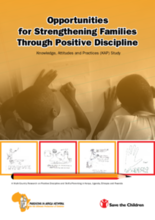In many African cultures and societies, families had some very unique and positive ways of nurturing children into responsible adults. Through stories, games and many other activities embedded with lessons, parents, grandparents and other extended family members disciplined and moulded the character of children, such that they grew up understanding the world around them, and with respect for one another.
Unfortunately, due to gradual changes in the socioeconomic sector, family kinship ties have weakened, leaving many families without social safety nets that extended family and social kin provided in the past. The stresses and struggles evident as people try to make ends meet, leaves no time for parents to bond and nurture their children positively. Punishment (inflicting pain) has replaced nurturing and sensitive caregiving, and is perceived as a quick fix to disciplining or correcting behaviour in children. It is no wonder then that all sorts of painful and humiliating punishment, namely; slapping, pinching, use of a rod, cane or other objects, violent shaking, isolation, use of abusive words to shame, and many more, are being used for disciplining.
In addition, many organizations including various African Governments across the continent are working to address some of these issues through accelerated efforts towards a total ban of corporal punishment in all contexts where children exist. Unfortunately, these efforts have not been as vigorous as they should be, noting the high numbers of children who are still experiencing severe forms of violence, perceived as a means for disciplining.
With this in mind, Parenting in Africa Network (PAN) and Save the Children International (SCI) commissioned a multi-country study on the Knowledge, Attitudes and Practices (KAP) of parents and/or caregivers in disciplining, and parenting. This study intended to develop data regarding how families parent and nurture good behaviour in their children; whether they know what would constitute nonviolent (positive) discipline; and if they actually utilized the positive aspects of disciplining. The study was conducted in specific areas (study clusters) in Kenya, Uganda, Ethiopia and Rwanda.
In general, the study established some level of knowledge and practice of non-violent methods of disciplining among parents and caregivers, despite some negative attitudes towards the concept. Focus group discussions with parents and caregivers revealed that the knowledge they had, on parenting, was mainly around provision of basic needs but not on key principles of skilful parenting such as promotion and supporting of the physical, emotional, social and intellectual development of a child, from infancy to adulthood.
From the findings, some of the methods of disciplining children included: providing basic necessities, rewarding good behaviour,5 recognising the children, teaching mutual respect, regular meetings with children, involving children in decision making, beating (smacking), encouraging and showing warmth and affection. Among the respondents, there was no common or popular method of disciplining children. No single method was mentioned by at least 50% of the respondents. Thus, the methods of disciplining children greatly varied across the study sites. Also, it was anticipated that respondents were aware that smacking (beating) is a violent form of disciplining. However, 23% of the respondents mentioned it as a means for correcting behaviour. Further, parents and caregivers had a negative attitude towards positive discipline, with less than half (43%) citing that it was necessary to beat children in order to discipline them. One respondent said: “…in order to bring up children well, one has to physically punish them…”
Although this study identified some practice of positive discipline methods, the practice of “negative” methods (such as physical punishment and psychologically aggressive methods) was widespread. In all the countries, almost half (48%) of the parents and caregivers interviewed had used physical punishment, within the year preceding the study. Relying on experiences of their own upbringing, 50% of the parents mentioned “copying how they were brought up” as a reason for practicing physical forms of punishment; while 35% of the parents relied on religious teachings. The most common methods of physical punishment used, included: slapping the child on the hand, arm or leg (84%) and hitting the child with various objects (39%). Shouting/ yelling at children and threatening to smack a child, in that order, were reported as the most practiced psychologically aggressive methods, at 70% and 68% respectively. Whenever children made mistakes, they preferred being counselled or talked to, to aggressive forms of punishment. Nevertheless, the children seemed to have been accustomed to physical punishment whenever they err.
From the findings, the most common sources of information on alternatives to physical forms of punishment were radio and religious teachings. A review of policies and legislation showed that out of the four countries, Kenya is the only country that has fully prohibited corporal/physical punishment in all settings, including the home, with a majority of the countries in the region prohibiting corporal/ physical punishment in schools and the judicial system. Nonetheless, the practice of corporal punishment was widespread in all the four study countries. It was also observed that all the study countries had ratified international legal instruments on child rights.
In the study areas, Save the Children, ANPPCAN and their partners were the main organisations implementing specific advocacy programs geared towards eliminating physical punishment. However, it was found out that several other organisations, including Parenting in Africa Network partners (PAN Chapters in Kenya, Uganda, Rwanda and Ethiopia), were implementing child protection and skilful parenting programs and interventions. These present opportunities for rolling out positive discipline programs that are integrated with skilful parenting programs and other child-focused interventions.

